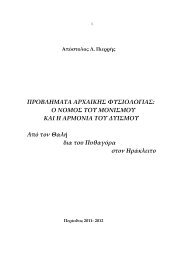APPENDIX C΄ ON DEPILATION: BODY COSMETICS IN CLASSICAL ...
APPENDIX C΄ ON DEPILATION: BODY COSMETICS IN CLASSICAL ...
APPENDIX C΄ ON DEPILATION: BODY COSMETICS IN CLASSICAL ...
You also want an ePaper? Increase the reach of your titles
YUMPU automatically turns print PDFs into web optimized ePapers that Google loves.
<strong>ON</strong> DEPILATI<strong>ON</strong>: <strong>BODY</strong> <strong>COSMETICS</strong> <strong>IN</strong> <strong>CLASSICAL</strong> ANTIQUITY 599<br />
her female nature (in all senses) and not a monstrosity of a woman<br />
with man-like feelings and thoughts etc. And again this latter<br />
dimension of meaning subtly alludes to the converse deceit actually<br />
being at work against the women. Thus the speaking woman also<br />
means: if she is a true woman, like the rest of us, she would feel like us<br />
and would not condemn in such a sweeping way practices and<br />
behaviour which we women all feel the urge towards, and, to a lesser<br />
or greater extent, all follow. And this sense has a special effect since<br />
Mnesilochus is not, in reality, a true woman at all.<br />
NOTE<br />
1. The legal situation as regards punishment of adultery in Athens seems to<br />
have been as follows. There was an ancient law which allowed the husband to<br />
kill the adulterer (if he caught him in the act of criminal intercourse with his<br />
wife) with impunity: Lysias, de Caede Eratosth. 30-2. The law was contained<br />
in the Solonian legislation; Plutarch Solon, XXIII, 1. But whether this law<br />
was actually considered valid in classical times, or if so, whether it was<br />
actually applied, is difficult to decide. Lysias, of course, invokes it; but even<br />
from what he says about the fact that actual, violent rape was not liable to<br />
death penalty (32-3; cf. 34 sqq.) [although he gives a transparently rhetorical<br />
turn to this discrepancy which, however, even if were itself discredited by the<br />
‚È·˙Ô̤ÓFË in Plato, Leges 874c, was nonetheless a peculiar feature of Solon’s<br />
codification of laws concerning women, v. Plutarch, Solon, XXIII, 1-4] we<br />
may conclude that the ancient law had fallen into relative or absolute<br />
abeyance. There might only be a question of the courts displaying some<br />
lenience towards one who killed the adulterer of his wife in the heat of<br />
passion and at the moment when not designedly caught them in the actual<br />
act. I think Lysias implicitly concedes so much in his peroration to the speech<br />
in question. There (§49) he represents the standing laws as allowing â¿Ó ÙȘ<br />
ÌÔȯeÓ Ï¿‚FË, ¬,ÙÈ iÓ ‚Ô‡ÏËÙ·È ¯ÚÉÛı·È. Perhaps the ancient traditional and<br />
Pre-Solonian law had this form (rather than specifically allowing the killing<br />
of the adulterer), but the custom in classical times was to allow less than<br />
killing, namely what Aristophanes refers to. And even this was rather a<br />
liability reserved for the end of a law-suit; the normal procedure seems to be<br />
the one described by Demosthenes, Contra Neairam p. 1367 Reiske (§§65-<br />
6): the husband, by threatening the adulterer with an indictment or with<br />
violence on the spot, might agree to take a sum of money from him by way<br />
of compensation, and detain him in order to coerce him into such an










